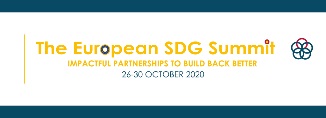The annual European SDG Summit, that is hosted by CSR Europe, brings together the sustainability community. This year’s summit focused on “Impactful Partnerships to Build Back Better”. Over the course of five days (26-30.11.2020), business leaders, industry federations, policy makers and other stakeholders participated in various high-level plenaries, as well as national and international roundtables. It doesn’t come as a surprise, that the topics discussed focused on the impact of the COVID-19 pandemic and how to build back better and more resilient economies, societies and businesses within the framework of the SDGs.
The event’s highlight from an industry perspective was the inauguration of the “European Act for Sustainable Industry” that aims at scaling up the efforts by industry and business stakeholders, as well EU leaders to build back better and achieve the SDGs and make the Green Deal a success. For more information on the campaign please click here.
The event included over 55 sessions which attracted more than 5,500 participants and over 400 speakers from European institutions, governments, businesses, industry federations, and non-profit organizations worldwide. The sessions dealt with a broad variety of topics, also relevant for Food Banks:
- Circular economies and consumers
- Sustainable food chains and turning food waste into donations
- How to make better use of data and technology in CSR
- Impact of COVID-19 on the implementation of SDGs
- Impact of SDGs in the private and nongovernmental sector
- Social dimension of CSR, such as tackling inequalities, engaging young people in sustainability or discussing the future of workforce
Angela Frigo, FEBA Secretary General, was invited to participate in the roundtable “Turning food losses into food donations” on 28 October. During her speech, she introduced the work of FEBA and its members and highlighted the topic of relationships with donor companies and the main drivers and barriers to activate the donation process.
The core activities of Food Banks brings together two parallel worlds: the profit and the non-profit world. She stressed that the relationships that are built have not the sole purpose of donating surplus food, but to achieve shared goals with positive impacts on the efficiency of the company itself as well as achieving a “new value” for the common good. However, some barriers identified in relation to these partnerships are the factionalism and ambiguity of communication, lack of initiative of the company’s management as well as the vision of the donation process as a cost in terms of economic, human and time resources. In order to tackle these challenges, especially in times of crises, there are several drivers that can facilitate the development of relationships, such as common definitions and methodology, ad hoc regulation on European and national level, innovation and investment, strategic management, definition of procedures and commitment of the company, sharing success stories and finally multi-stakeholder collaboration. She concluded by stressing the importance of the improvement of partnerships, especially in a time where Food Banks experience an increase in demand for food aid of 30% at European level, with a range from 6% to 90% in the different countries.
All sessions can be watched on demand here.




